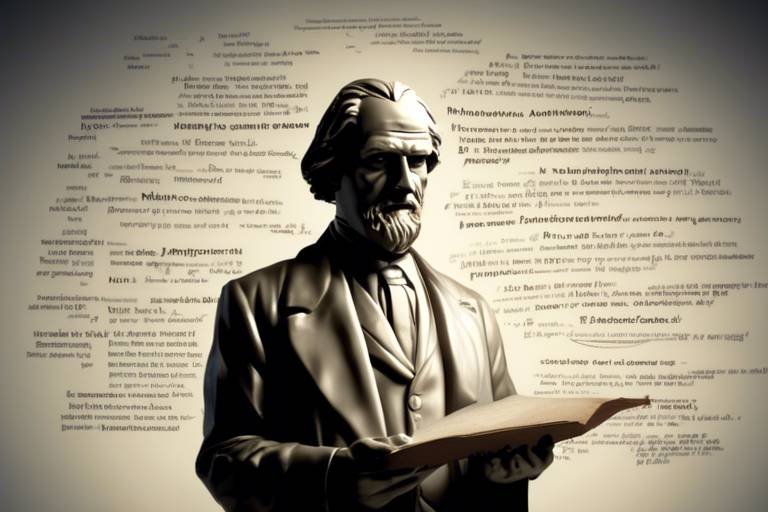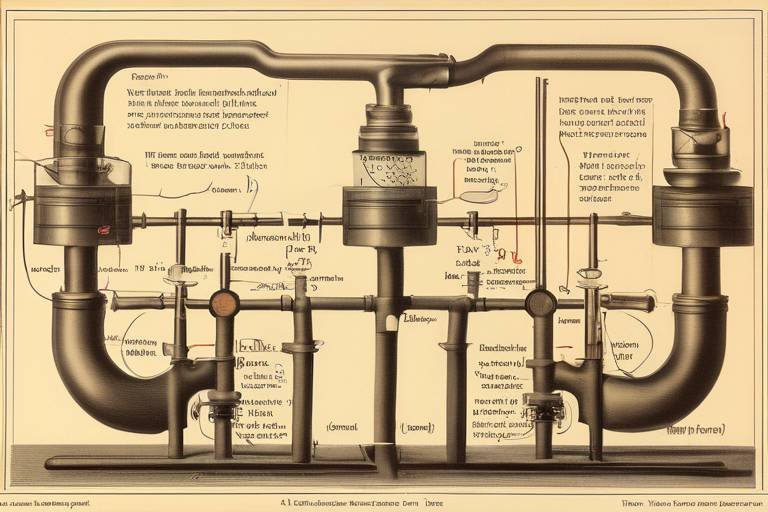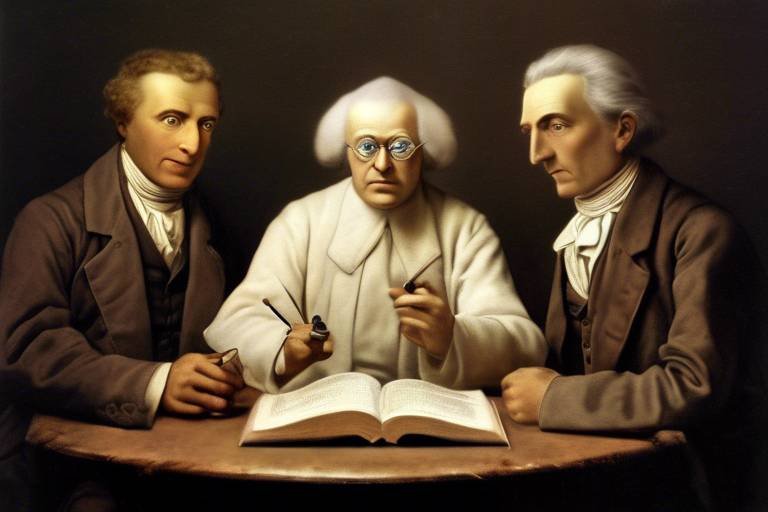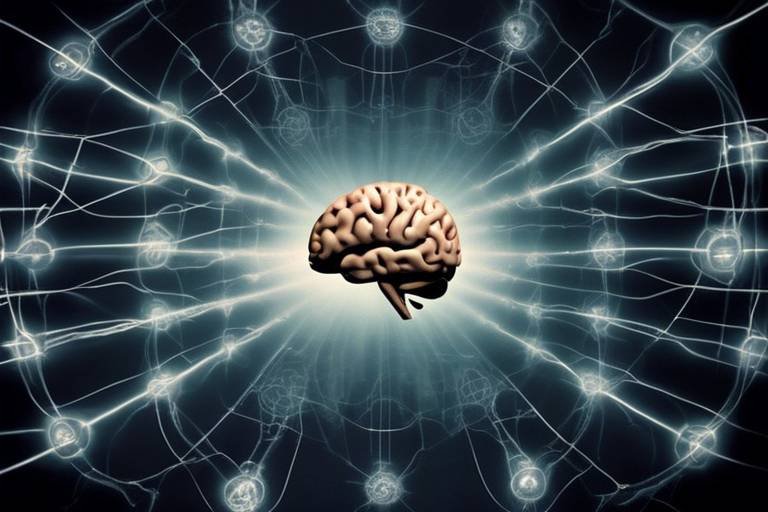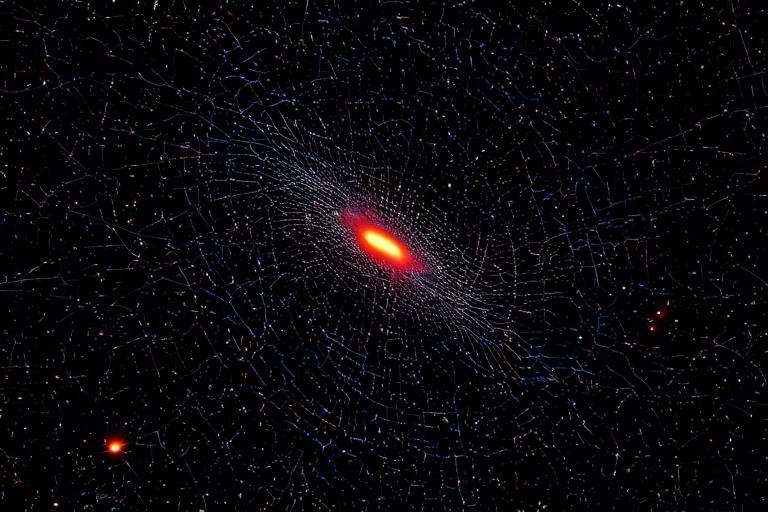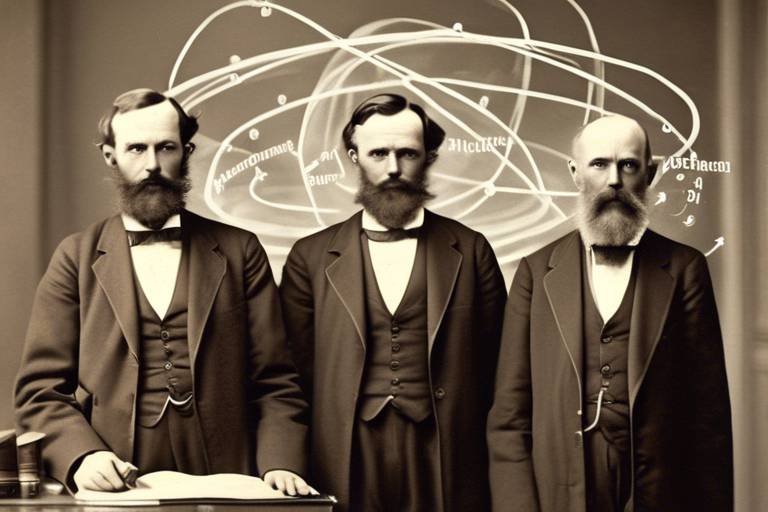How Does Human Cognition Advance through Scientific Discoveries?
Have you ever wondered how our understanding of the world has evolved over time? It’s fascinating to think about how scientific discoveries have not only shaped our knowledge but also transformed the very way we think. The relationship between scientific discoveries and human cognition is like a dance; each step forward in science leads to a new rhythm in our cognitive abilities. From the earliest observations of the night sky to the latest advancements in artificial intelligence, every breakthrough has contributed to our intellectual evolution. This article delves into the intricate connection between scientific inquiry and cognitive development, illustrating how pivotal discoveries have propelled humanity into new realms of understanding.
At the heart of human cognition lies scientific inquiry. This process allows us to ask questions, explore the unknown, and seek answers to complex phenomena that surround us. Think of it as a mental toolkit; each tool represents a different method of questioning and understanding. By engaging in scientific inquiry, we enhance our cognitive abilities and critical thinking skills. It’s like sharpening a knife—the more we practice, the more precise and effective we become. Scientific inquiry pushes us to challenge existing beliefs, encouraging a mindset that values evidence over assumption. This fundamental shift in thinking is what drives cognitive advancement and helps us navigate the complexities of our world.
When we examine the timeline of scientific breakthroughs, we uncover significant milestones that have profoundly impacted human cognition. Each discovery acts as a stepping stone, leading us closer to a comprehensive understanding of our universe. For instance, the transition from superstition to empirical observation marked a critical turning point in our intellectual journey. Let’s take a closer look at some of these pivotal moments.
The Copernican Revolution was a game-changer. Imagine living in a world where everything revolved around you, only to discover that you’re just a speck in a vast universe. This shift from a geocentric to a heliocentric model fundamentally altered human perspective. It was like lifting a veil; suddenly, we could see our place in the cosmos with clarity. This newfound understanding fostered a greater appreciation for the complexity of the universe and ignited a thirst for knowledge that propelled scientific inquiry forward.
But the impact of this revolution didn’t stop at astronomy; it rippled through philosophy as well. Thinkers like Descartes and Kant found themselves wrestling with profound questions about existence and knowledge. The Copernican Revolution expanded cognitive frameworks, prompting debates that would shape modern philosophy. This interplay between science and philosophy illustrates how discoveries can challenge our beliefs and push us to rethink our understanding of reality.
The development of telescopes and other technologies further fueled exploration, enabling deeper inquiries into the universe. These advancements allowed us to observe celestial bodies with unprecedented clarity, enhancing our cognitive capacities related to observation and analysis. It’s akin to putting on a pair of glasses for the first time; suddenly, the world comes into focus, and we can see details we never knew existed.
The Age of Enlightenment marked another surge in scientific reasoning and empirical thought. This period was characterized by a relentless pursuit of knowledge, where evidence-based understanding became paramount. The Enlightenment thinkers championed the idea that human beings could improve their lives through reason and scientific inquiry. This shift not only advanced human cognition but also laid the groundwork for modern science as we know it today.
Fast forward to today, and we find ourselves amidst a whirlwind of modern scientific discoveries that continue to reshape our understanding of cognition and the human mind. Breakthroughs in fields like neuroscience and artificial intelligence are unveiling the complexities of our cognitive processes and challenging our traditional notions of intelligence.
Neuroscience has emerged as a powerful tool in our quest to understand the human brain. It provides insights into cognitive processes, revealing the biological underpinnings of thought, learning, and memory. Imagine being able to peek inside your brain and see how thoughts are formed and memories are created. This field not only enhances our understanding of cognition but also opens up new avenues for improving mental health and cognitive function.
On the other hand, artificial intelligence is revolutionizing the way we approach learning and problem-solving. AI technologies challenge and expand our cognitive capacities, offering new tools for creativity and innovation. However, they also raise important questions about the nature of intelligence itself. Are we on the brink of creating machines that can think like us? This intersection of AI and human cognition is a thrilling frontier, prompting us to reconsider what it means to be intelligent.
- How do scientific discoveries influence our everyday lives?
Scientific discoveries provide the foundation for technological advancements that improve our quality of life, from medical breakthroughs to innovations in communication. - Can scientific inquiry enhance critical thinking skills?
Absolutely! Engaging in scientific inquiry encourages individuals to question assumptions, analyze information critically, and draw evidence-based conclusions. - What is the significance of the Copernican Revolution?
The Copernican Revolution fundamentally changed our understanding of the universe, shifting the perspective from Earth-centered to sun-centered, which had profound implications in both science and philosophy. - How is neuroscience changing our understanding of the mind?
Neuroscience provides insights into how the brain functions, helping us understand cognitive processes such as memory, learning, and decision-making.

The Role of Scientific Inquiry
Scientific inquiry is more than just a method; it's a dynamic process that fuels our quest for knowledge and understanding. Imagine standing at the edge of a vast ocean, where each wave represents a question waiting to be answered. This is the essence of scientific inquiry—it invites us to dive deep into the unknown, to explore the mysteries that surround us, and to emerge with insights that can transform our understanding of the world. Through observation, experimentation, and analysis, we not only uncover new facts but also sharpen our cognitive abilities and enhance our critical thinking skills.
At its core, scientific inquiry encourages us to ask the big questions. It empowers us to challenge assumptions and seek evidence. This process of questioning is vital because it lays the groundwork for intellectual growth. When we engage in scientific inquiry, we are not merely passive recipients of information; instead, we become active participants in the creation of knowledge. This active engagement stimulates our brains, fostering a sense of curiosity and wonder that compels us to learn more. For instance, consider how the simple act of asking "Why?" can lead to profound discoveries. This inquiry-driven approach is fundamental to human cognition, as it encourages us to think critically and creatively.
Moreover, scientific inquiry has practical implications that extend beyond mere curiosity. It influences various aspects of our lives, from healthcare advancements to technological innovations. When scientists conduct experiments and gather data, they are not just fulfilling academic requirements; they are contributing to solutions that can address real-world problems. For example, breakthroughs in medical research have resulted in life-saving treatments that enhance our quality of life. These advancements are a direct result of rigorous scientific inquiry, showcasing how this process leads to tangible benefits.
To illustrate the impact of scientific inquiry on cognitive development, consider the following key components:
| Component | Description |
|---|---|
| Curiosity | The desire to learn and understand stimulates inquiry. |
| Critical Thinking | The ability to analyze information and evaluate evidence enhances decision-making. |
| Problem-Solving | Inquiry fosters innovative solutions to complex challenges. |
| Collaboration | Working with others in scientific endeavors leads to shared knowledge and diverse perspectives. |
In conclusion, the role of scientific inquiry is pivotal in advancing human cognition. It not only enriches our understanding of the universe but also equips us with the tools we need to navigate an increasingly complex world. By fostering curiosity, critical thinking, and collaboration, scientific inquiry lays the foundation for a future where knowledge is not just accumulated but actively created. So, the next time you find yourself pondering a question, remember that the journey of inquiry is just as important as the answers you seek.
- What is scientific inquiry? - Scientific inquiry is a systematic process of asking questions, conducting experiments, and analyzing data to gain knowledge and understanding.
- Why is scientific inquiry important? - It enhances cognitive abilities, promotes critical thinking, and leads to real-world solutions.
- How does curiosity relate to scientific inquiry? - Curiosity drives individuals to explore and question, which is essential for scientific discovery.

Historical Milestones in Science
Throughout history, there have been pivotal moments in science that have not only advanced our understanding of the universe but have also profoundly impacted human cognition. These milestones serve as stepping stones, guiding us from ignorance to enlightenment, and each has played a crucial role in shaping how we perceive the world around us. The journey of scientific discovery is akin to climbing a mountain; each peak reached unveils a broader vista, allowing us to see further and understand more. Let's delve into some of the most significant breakthroughs that have transformed our intellectual landscape.
The Copernican Revolution, initiated by the work of Nicolaus Copernicus in the 16th century, marked a monumental shift in our understanding of the cosmos. Prior to this, the prevailing belief was that Earth was the center of the universe—a geocentric model. Copernicus proposed a heliocentric model, placing the Sun at the center and asserting that the Earth and other planets revolve around it. This radical idea was not merely a scientific theory; it was a cognitive leap that fundamentally altered human perspective. Imagine the shock and awe of realizing that we are not the center of everything but rather a small part of a vast, dynamic universe.
The implications of the Copernican Revolution extended far beyond astronomy. It ignited philosophical debates that expanded cognitive frameworks. Thinkers like René Descartes and Immanuel Kant were influenced by this shift, as it prompted them to reevaluate concepts of knowledge and existence. The revolution encouraged a new way of thinking—one that embraced doubt and inquiry. It suggested that our understanding of the world could evolve with new evidence, challenging long-held beliefs. This philosophical evolution laid the groundwork for modern epistemology, urging us to seek knowledge through reason and observation.
Accompanying the Copernican Revolution were significant technological advancements. The invention of telescopes allowed for greater exploration of the heavens, enabling astronomers to observe celestial bodies with unprecedented clarity. This technological leap not only enhanced our understanding of the universe but also fostered cognitive capacities related to observation and analysis. The ability to see beyond our immediate surroundings and question what we observe is a hallmark of human cognition, and the telescope was a tool that expanded our intellectual horizons.
Fast forward to the Enlightenment period, which spanned the 17th and 18th centuries. This era was characterized by a surge in scientific reasoning and empirical thought, significantly advancing human cognition. Thinkers like Isaac Newton and Galileo Galilei championed the scientific method, emphasizing observation, experimentation, and evidence-based conclusions. The Enlightenment was like a breath of fresh air; it encouraged individuals to think critically and challenge traditional authority, paving the way for modern science. The power of reason became the cornerstone of human thought, and with it came a deeper understanding of the natural world.
During this period, the concept of natural rights emerged, influencing political philosophy and social structures. The emphasis on reason and individualism not only transformed science but also reshaped society, encouraging people to question norms and seek knowledge. The Enlightenment laid the foundation for future scientific advancements, fostering an environment where inquiry and skepticism thrived.
In summary, historical milestones in science have been instrumental in advancing human cognition. Each breakthrough, from the Copernican Revolution to the Age of Enlightenment, has reshaped our understanding of the world and ourselves. As we continue to explore and discover, it is essential to recognize the cognitive leaps that accompany these advancements, reminding us that the pursuit of knowledge is a journey without end.
- What was the Copernican Revolution?
The Copernican Revolution was a paradigm shift in astronomy that proposed the heliocentric model of the universe, placing the Sun at the center instead of the Earth.
- How did the Enlightenment influence modern science?
The Enlightenment emphasized reason and empirical evidence, laying the groundwork for the scientific method and encouraging critical thinking that continues to shape scientific inquiry today.
- What role did technology play in scientific advancements?
Technological advancements, such as the telescope, enhanced our ability to observe and understand the universe, leading to significant cognitive developments in analysis and inquiry.

The Copernican Revolution
The Copernican Revolution was not just a scientific breakthrough; it was a seismic shift in human thought that redefined our understanding of the universe. Before this pivotal moment, the prevailing belief was that the Earth was the center of the universe, a notion deeply rooted in ancient philosophy and religion. This geocentric view, endorsed by figures like Ptolemy, placed humanity at the center of creation, which inherently shaped our perception of ourselves and our place in the cosmos.
However, when Nicolas Copernicus proposed a heliocentric model—where the Sun, not the Earth, occupied the center of the universe—it was akin to opening a window in a stuffy room. Suddenly, fresh air flooded in, and with it, new possibilities. This radical idea challenged the established order and encouraged people to question long-held beliefs. It was a call to intellectual arms, urging humanity to look beyond the apparent and to seek deeper truths.
The implications of this revolution extended far beyond astronomy. It sparked a wave of philosophical inquiry that transformed how we think about knowledge and existence. Thinkers like René Descartes and Immanuel Kant began to explore the nature of reality and the limits of human understanding. They questioned not only the physical world but also the very mechanisms of thought itself. This period marked a transition from a reliance on authority to an emphasis on reason and evidence, laying the groundwork for modern science.
Moreover, the Copernican Revolution ignited technological advancements that further propelled our cognitive evolution. The invention of the telescope, for instance, allowed scientists to observe celestial bodies in unprecedented detail. This technological leap not only enriched our understanding of the universe but also enhanced our cognitive capacities related to observation and analysis. The ability to see beyond our immediate surroundings fostered a sense of curiosity and wonder, pushing the boundaries of what we thought was possible.
In essence, the Copernican Revolution was a catalyst for a broader intellectual awakening. It encouraged humanity to embrace a more expansive view of the universe, one that acknowledged our smallness in the grand scheme of things but also our capacity for understanding and exploration. This shift in perspective was not merely about the stars; it was about the very nature of human cognition and the relentless pursuit of knowledge.
- What was the Copernican Revolution?
It was a paradigm shift in astronomy that proposed the heliocentric model of the universe, placing the Sun at its center instead of the Earth.
- Who was Nicolas Copernicus?
A Renaissance mathematician and astronomer who formulated the heliocentric theory, fundamentally changing our understanding of the cosmos.
- How did the Copernican Revolution affect philosophy?
It prompted a reevaluation of knowledge and existence, influencing philosophers like Descartes and Kant to explore the nature of reality and human understanding.
- What technological advancements emerged from this revolution?
The development of telescopes and other observational tools enhanced our ability to explore and understand the universe, leading to further scientific discoveries.

Impact on Philosophy
The Copernican Revolution was not just a scientific shift; it was a seismic event that reverberated through the corridors of philosophy. When Nicolaus Copernicus proposed that the Earth revolved around the Sun, rather than the other way around, it challenged the very fabric of human understanding. This radical idea forced thinkers to reevaluate their perceptions of the universe and humanity's place within it. It was as if a vast curtain had been pulled back, revealing a cosmos that was far more complex and expansive than previously imagined.
Philosophers like René Descartes and Immanuel Kant found themselves at the forefront of this intellectual upheaval. Descartes, with his famous dictum "Cogito, ergo sum" (I think, therefore I am), began to explore the relationship between thought and existence in a new light. The realization that our senses could deceive us, combined with the newfound understanding of a heliocentric universe, led him to seek a more robust foundation for knowledge. He argued that reason and rationality should guide human inquiry, a notion that became central to modern philosophy.
Kant, on the other hand, took this a step further by questioning the limits of human understanding. He posited that while we can know the world through our senses, there are bounds to what we can perceive and comprehend. This philosophical inquiry was directly influenced by scientific discoveries, including the Copernican model, which illustrated that our perspective shapes our understanding of reality. Kant's work laid the groundwork for critical philosophy, urging future generations to question not just the universe but also the very nature of knowledge itself.
Moreover, the Copernican Revolution sparked debates around epistemology—the study of knowledge. It led to inquiries about how we know what we know and what constitutes valid knowledge. Philosophers began to ponder questions such as:
- What is the role of observation in knowledge acquisition?
- Can we trust our senses, or are they mere illusions?
- How do scientific theories evolve, and what does that mean for our understanding of truth?
This intellectual ferment also paved the way for the Scientific Method, which emphasizes observation, experimentation, and the formulation of hypotheses. The method itself can be seen as a philosophical stance that advocates for a systematic approach to understanding the world, one that values evidence over dogma. In essence, the Copernican Revolution did not just alter our astronomical models; it transformed the philosophical landscape, encouraging a culture of inquiry that persists to this day.
In conclusion, the impact of the Copernican Revolution on philosophy is profound and multifaceted. It compelled thinkers to grapple with the implications of a universe that did not revolve around humanity, fostering a spirit of inquiry that has led to significant advancements in both science and philosophy. As we continue to explore the mysteries of the universe, we owe much of our intellectual heritage to the questions raised by this pivotal moment in history.
- What was the Copernican Revolution? The Copernican Revolution was the paradigm shift from a geocentric (Earth-centered) model of the universe to a heliocentric (Sun-centered) model proposed by Nicolaus Copernicus.
- How did the Copernican Revolution affect philosophy? It challenged existing beliefs about humanity's place in the universe, prompting philosophers to rethink concepts of knowledge, existence, and the nature of reality.
- Who were some key philosophers influenced by the Copernican Revolution? Notable philosophers include René Descartes and Immanuel Kant, who explored the implications of a heliocentric universe on knowledge and existence.
- What is the significance of the Scientific Method in philosophy? The Scientific Method represents a systematic approach to inquiry that values observation and evidence, significantly shaping modern scientific and philosophical thought.

Technological Advancements
Technological advancements have played a pivotal role in shaping our understanding of the universe and enhancing our cognitive capabilities. Think about it: every innovative tool we've created has opened new doors to exploration and understanding. For instance, the invention of the telescope in the early 17th century didn't just allow us to gaze at the stars; it revolutionized our entire perspective on the cosmos. Suddenly, the vastness of space was no longer a mystery, but a realm to be studied and understood. This shift in perspective is akin to finding a new lens through which to view the world, one that magnifies not just objects, but our capacity for inquiry and analysis.
Moreover, advancements in technology have led to the development of sophisticated instruments that have further propelled scientific discovery. Instruments like spectrometers and particle accelerators have enabled scientists to delve deeper into the fabric of reality, uncovering the building blocks of matter and the fundamental forces that govern the universe. Each of these discoveries has not only expanded our knowledge but has also enhanced our cognitive abilities by challenging us to think critically and creatively about complex problems.
To illustrate the impact of these technological advancements, consider the following table that highlights some key innovations and their contributions to science:
| Technology | Year of Invention | Significance |
|---|---|---|
| Telescope | 1608 | Revolutionized astronomy and our understanding of the universe. |
| Microscope | 1590 | Opened up the world of microbiology, revealing life at a microscopic level. |
| Particle Accelerator | 1930s | Allowed for the exploration of atomic and subatomic particles, deepening our understanding of matter. |
| Computer | 1940s | Transformed data processing and analysis, leading to advancements in multiple scientific fields. |
As we continue to innovate, each new technological advancement not only enhances our understanding of the world but also reshapes our cognitive processes. The ability to analyze vast amounts of data, simulate complex systems, and visualize intricate concepts has elevated our intellectual pursuits to unprecedented heights. It's almost as if technology acts as a catalyst for our cognitive evolution, pushing us to think beyond traditional boundaries and explore new realms of knowledge.
In conclusion, the relationship between technological advancements and human cognition is a dynamic and evolving one. As we embrace new technologies, we also expand our cognitive horizons, continually redefining what it means to understand and explore the world around us. With each leap forward, we find ourselves better equipped to tackle the mysteries of existence, armed with tools that not only aid our exploration but also enhance our very ability to think and reason.
- What are some examples of technological advancements that have impacted cognition?
Examples include the telescope, microscope, and computer, each contributing to our understanding of complex phenomena. - How does technology enhance critical thinking?
Technology provides tools that allow for deeper analysis, data visualization, and simulation, fostering critical thinking skills. - Can advancements in technology lead to cognitive overload?
Yes, while technology can enhance cognition, it can also lead to information overload if not managed properly. - What is the future of technology and cognition?
The future may involve even more integration of artificial intelligence and machine learning, further expanding our cognitive capabilities.

The Age of Enlightenment
The Age of Enlightenment, often referred to as the Age of Reason, was a remarkable period in history that spanned the late 17th to the 18th century. During this time, thinkers and philosophers began to challenge traditional beliefs and advocate for reason, scientific inquiry, and individual rights. This intellectual movement significantly advanced human cognition by promoting a culture of questioning and skepticism, which laid the groundwork for modern scientific thought.
One of the hallmarks of the Enlightenment was the emphasis on empirical evidence and rational thought. Enlightenment thinkers believed that knowledge should be based on observable phenomena rather than religious dogma or superstition. This shift in perspective encouraged individuals to seek answers through experimentation and observation, ultimately enhancing their cognitive abilities. The idea that humans could understand and manipulate the world around them was revolutionary, leading to significant advancements in various fields, including science, philosophy, and politics.
Key figures of the Enlightenment, such as John Locke, Voltaire, and Jean-Jacques Rousseau, contributed greatly to the evolution of human thought. They emphasized the importance of reason and the potential for human progress. For instance, Locke's theories on the mind as a "tabula rasa" or blank slate suggested that experience shapes knowledge, thereby reinforcing the idea that learning and understanding are dynamic processes. This concept encouraged people to view themselves as active participants in their intellectual development.
Moreover, the Enlightenment period fostered the establishment of institutions that prioritized education and knowledge dissemination. The creation of public libraries, scientific societies, and universities became crucial in spreading Enlightenment ideas. These institutions not only provided access to information but also encouraged collaborative inquiry, leading to a more informed and critically thinking populace. As a result, the collective cognitive capacity of society expanded, paving the way for future scientific discoveries and innovations.
In addition to philosophical advancements, the Enlightenment also sparked a wave of technological progress. Innovations in various fields, such as mathematics, astronomy, and physics, were propelled by the scientific method, which became a cornerstone of Enlightenment thought. The works of scientists like Isaac Newton exemplified this shift, as his laws of motion and universal gravitation not only transformed physics but also inspired future generations to explore the natural world with a scientific lens.
Ultimately, the Age of Enlightenment was a catalyst for cognitive growth and transformation. It instilled in individuals the belief that through reason and inquiry, they could unlock the mysteries of the universe. This era not only shaped the intellectual landscape of its time but also laid the groundwork for the modern world, influencing everything from democracy to the scientific method. The legacy of the Enlightenment continues to resonate today, reminding us of the power of human thought and the importance of challenging the status quo.
- What was the main goal of the Age of Enlightenment? The main goal was to promote reason, scientific inquiry, and individual rights, challenging traditional beliefs and advocating for knowledge based on evidence.
- Who were some key figures of the Enlightenment? Key figures included John Locke, Voltaire, and Jean-Jacques Rousseau, who significantly influenced modern thought.
- How did the Enlightenment impact modern science? The Enlightenment emphasized the scientific method, leading to significant advancements in various scientific fields and encouraging empirical research.
- What is the legacy of the Enlightenment? The legacy includes the promotion of critical thinking, the establishment of educational institutions, and the foundation for modern democratic and scientific principles.

Modern Scientific Discoveries
In the ever-evolving landscape of science, have become pivotal in reshaping our understanding of cognition and the human mind. These advancements not only expand our knowledge but also challenge our perceptions of what it means to think and learn. For instance, breakthroughs in neuroscience have revealed intricate details about the brain's structure and function, illuminating how our cognitive processes work at a biological level. Imagine the brain as a complex city, where every neuron is a road, connecting various districts of thought, memory, and emotion. Each scientific discovery acts as a new blueprint, helping us navigate this sprawling metropolis of the mind.
Moreover, the rise of artificial intelligence (AI) has introduced a paradigm shift in how we perceive intelligence itself. AI technologies are not just tools; they are catalysts for expanding our cognitive capacities. They assist us in learning, problem-solving, and even creative endeavors. Think of AI as a new companion on our intellectual journey, offering insights and solutions that we might not have considered. However, this raises intriguing questions: What does it mean for something to be "intelligent"? Can machines truly think, or are they merely simulating our cognitive processes? These inquiries push us to rethink the very foundations of our understanding of intelligence.
To illustrate the impact of modern scientific discoveries, let's take a closer look at some key areas:
| Field | Key Discoveries | Impact on Cognition |
|---|---|---|
| Neuroscience | Mapping of the human connectome | Enhanced understanding of brain connectivity and its role in cognition |
| Artificial Intelligence | Deep learning algorithms | Improved problem-solving capabilities and adaptive learning |
| Cognitive Psychology | Insights into memory formation | Better strategies for learning and retention |
These discoveries are just the tip of the iceberg. As we delve deeper into the realms of neuroscience and AI, we uncover more about how our minds work and how we can harness this knowledge to improve our cognitive abilities. The interplay between human cognition and scientific discovery is akin to a dance, where each step leads to a greater understanding of ourselves and the universe.
As we embrace these modern advancements, it’s essential to remain curious and critical. While science opens new doors of understanding, it also invites us to question our assumptions and beliefs. So, what does the future hold? Will we unlock even more secrets of the human mind? Only time will tell, but one thing is for sure: the journey of discovery is far from over.
- What is the significance of modern scientific discoveries? Modern scientific discoveries enhance our understanding of cognition, allowing us to explore the complexities of the human mind and improve our learning processes.
- How does neuroscience impact our understanding of cognition? Neuroscience reveals the biological mechanisms behind cognitive functions, helping us understand how we think, learn, and remember.
- What role does artificial intelligence play in cognitive advancement? AI technologies provide new tools for learning and problem-solving, challenging our perceptions of intelligence and expanding our cognitive capacities.

Neuroscience and Cognition
Neuroscience has emerged as a powerful field that delves into the intricate workings of the human brain, unraveling the mysteries behind our cognitive processes. Imagine the brain as a complex city, with each neuron representing a bustling street and every synapse acting as a vital intersection. This vibrant network is responsible for everything we think, feel, and do. As we explore the relationship between neuroscience and cognition, we begin to understand how our brain's architecture influences our ability to learn, remember, and make decisions.
One of the most significant revelations from neuroscience is the concept of **neuroplasticity**. This fascinating ability of the brain to reorganize itself by forming new neural connections throughout life highlights that our cognitive abilities are not fixed. Just like a city that can expand or change its layout, our brains can adapt based on experiences and learning. This means that whether you’re picking up a new language or mastering a musical instrument, your brain is actively reshaping itself to accommodate these new skills.
Moreover, neuroscience has provided insights into various cognitive processes such as attention, memory, and problem-solving. For instance, studies have shown that different regions of the brain are activated when we engage in different types of thinking. The prefrontal cortex, often referred to as the brain's executive center, plays a crucial role in decision-making and planning. On the other hand, the hippocampus is essential for forming new memories. Understanding these brain functions not only enhances our knowledge of cognition but also informs educational practices and therapeutic interventions.
Let’s take a closer look at some of the key areas that neuroscience has illuminated regarding cognition:
- Attention: Neuroscience has shown that our ability to focus is limited and can be influenced by various factors, including distractions and mental fatigue. Techniques such as mindfulness and cognitive training can help improve attention spans.
- Memory: The process of encoding, storing, and retrieving information involves multiple brain regions. Neuroscience has revealed that our memories are not static; they can change over time, influenced by new experiences and context.
- Problem-Solving: Different types of problem-solving tasks activate different brain regions. Functional MRI studies have shown that creative problem-solving engages the default mode network, while analytical tasks engage the task-positive network.
As we continue to advance our understanding of the brain through neuroscience, we are not only enhancing our cognitive capabilities but also paving the way for innovative approaches in education and mental health. For example, therapies that leverage neuroplasticity can help individuals recover from cognitive impairments or enhance their learning potential. This is akin to a city implementing new infrastructure to improve traffic flow—by optimizing the pathways in our brains, we can enhance our overall cognitive performance.
In conclusion, the interplay between neuroscience and cognition is a fascinating journey into the depths of the human mind. As we uncover the mechanisms behind our thoughts and behaviors, we empower ourselves with knowledge that can transform how we learn, teach, and engage with the world around us. The more we learn about our brain, the more we realize that the possibilities for growth and development are virtually limitless.
Q1: What is neuroplasticity?
A1: Neuroplasticity refers to the brain's ability to reorganize itself by forming new neural connections. This means that our cognitive abilities can change and improve throughout our lives based on our experiences and learning.
Q2: How does neuroscience impact education?
A2: Neuroscience informs educational practices by providing insights into how we learn and remember. This knowledge can help educators develop more effective teaching strategies that align with how the brain processes information.
Q3: Can cognitive abilities be improved?
A3: Yes, cognitive abilities can be improved through various methods such as cognitive training, learning new skills, and engaging in activities that challenge the brain, like puzzles or learning a new language.

Artificial Intelligence's Role
Artificial Intelligence (AI) is not just a buzzword; it’s a revolutionary force that is reshaping our understanding of cognition and intelligence itself. Imagine a world where machines can learn, adapt, and even create—this is the reality we are stepping into. AI technologies are designed to mimic human thought processes, but they do so in ways that can expand our cognitive capacities beyond traditional limits. For instance, AI can analyze vast amounts of data at lightning speed, uncovering patterns and insights that would take humans years to discern. This capability is like having a supercharged brain that never tires, constantly learning and evolving.
One of the most intriguing aspects of AI is its ability to enhance our problem-solving skills. By using machine learning algorithms, AI can offer solutions to complex problems that we might not even be aware of. It’s akin to having a wise mentor who not only provides answers but also teaches us how to think differently about challenges. This interaction encourages us to push the boundaries of our own cognitive abilities, prompting us to ask deeper questions and explore new avenues of thought.
Moreover, AI is revolutionizing education and learning. Personalized learning experiences powered by AI adapt to individual student needs, making education more effective and engaging. For example, AI can assess a student’s strengths and weaknesses, tailoring lessons that cater specifically to their learning style. This is a game changer; it’s like having a personal tutor available 24/7, ensuring that no one is left behind. As a result, learners can grasp complex concepts more quickly and retain information longer, fundamentally altering the landscape of education.
However, the rise of AI also raises profound questions about the nature of intelligence. Are we merely programming machines to replicate human thought, or are we creating something entirely new? This philosophical inquiry challenges our understanding of what it means to be intelligent. As we integrate AI into our daily lives, we must grapple with these questions and consider the implications for our cognitive development.
To illustrate the impact of AI on cognition, consider the following table that summarizes key areas where AI is making a difference:
| Area | Impact of AI |
|---|---|
| Education | Personalized learning experiences that adapt to individual needs. |
| Healthcare | Improved diagnostics and treatment plans through data analysis. |
| Creative Arts | AI-generated art and music that challenges traditional notions of creativity. |
| Business | Enhanced decision-making through predictive analytics and data-driven insights. |
In conclusion, the role of AI in advancing human cognition is multifaceted and profound. It not only enhances our capabilities but also invites us to rethink the very essence of intelligence. As we continue to explore the potential of AI, we must remain vigilant, ensuring that these technologies serve to enrich our cognitive landscape rather than diminish it.
- What is Artificial Intelligence? AI refers to the simulation of human intelligence in machines that are programmed to think and learn like humans.
- How does AI enhance learning? AI personalizes educational experiences, adapting to individual learning styles and needs.
- What are the ethical concerns surrounding AI? Issues include privacy, job displacement, and the implications of creating machines that can think independently.
- Can AI surpass human intelligence? While AI can outperform humans in specific tasks, the broader concept of intelligence encompasses emotional and social understanding that AI currently lacks.
Frequently Asked Questions
- What is the significance of scientific inquiry in human cognition?
Scientific inquiry is crucial as it lays the groundwork for how we acquire knowledge. It encourages us to ask questions, explore our surroundings, and comprehend complex phenomena. This process not only enhances our cognitive abilities but also sharpens our critical thinking skills, allowing us to make informed decisions based on evidence.
- How did the Copernican Revolution affect human understanding?
The Copernican Revolution was a game-changer! By shifting our view from a geocentric (Earth-centered) model to a heliocentric (Sun-centered) one, it radically transformed our perspective of the universe. This shift not only expanded our understanding of our place in the cosmos but also ignited philosophical debates that reshaped our cognitive frameworks.
- What role did the Age of Enlightenment play in cognitive advancement?
The Age of Enlightenment marked a pivotal moment in history where scientific reasoning and empirical thought took center stage. This period emphasized the importance of evidence-based knowledge, leading to significant advancements in human cognition. It encouraged individuals to think critically and embrace rationality, which has had lasting effects on how we understand the world today.
- How does neuroscience contribute to our understanding of cognition?
Neuroscience plays a vital role in unraveling the complexities of the human brain. By studying the biological underpinnings of thought, learning, and memory, neuroscience provides invaluable insights into cognitive processes. This knowledge helps us understand how we think, learn, and remember, ultimately enhancing our grasp of human cognition.
- What impact does artificial intelligence have on cognitive abilities?
Artificial intelligence is revolutionizing our cognitive landscape. It not only challenges our traditional notions of intelligence but also offers innovative tools for learning, problem-solving, and creativity. By augmenting our cognitive capacities, AI pushes the boundaries of what we can achieve, raising intriguing questions about the nature of intelligence and the future of human cognition.



